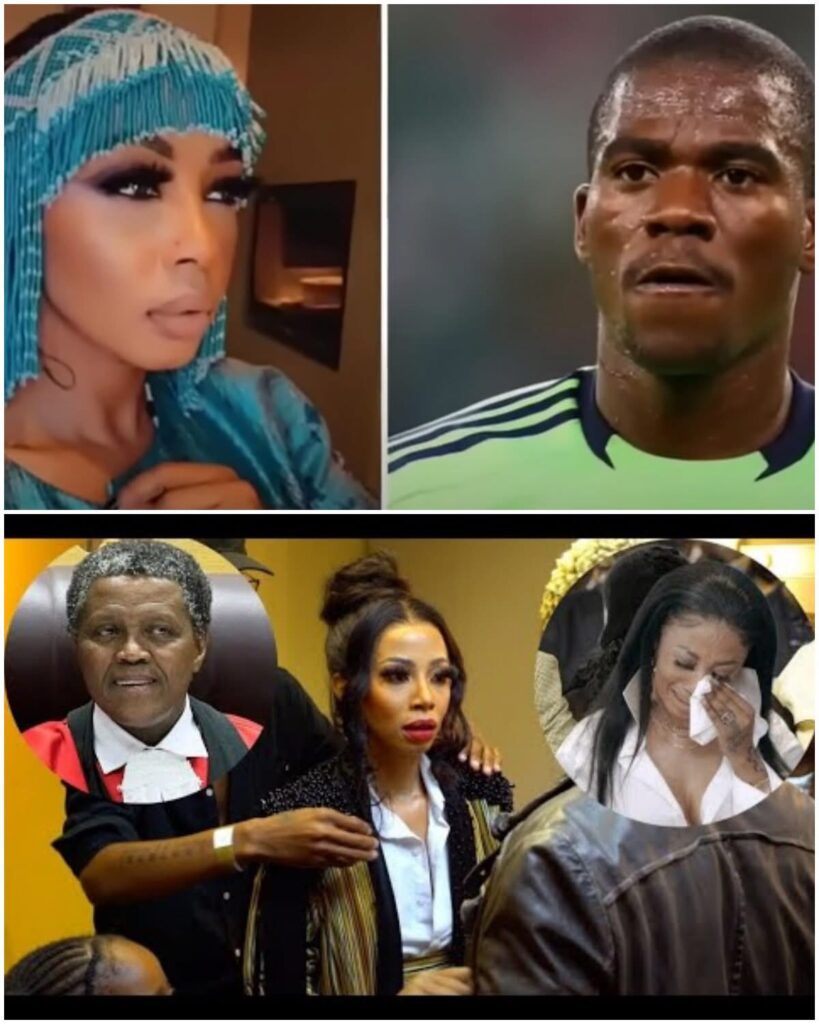
It was supposed to be just another quiet Sunday evening in Vosloorus, a township on the outskirts of Johannesburg. But on that night, South Africa lost its national soccer captain, Senzo Meyiwa, and gained a mystery that has haunted the country for nearly a decade. The story, which began with a single gunshot in the home of singer Kelly Khumalo, has since unraveled into a national saga of suspicion, betrayal, and a desperate search for the truth.
A Crime Scene Full of Questions
Senzo Meyiwa was gunned down in Khumalo’s kitchen, surrounded by six adults—all of whom claimed they saw nothing. There was no broken door, no shattered window, and, curiously, no usable description of the shooter. The official story was a “robbery gone wrong,” but if that were true, why did the robbers leave behind phones, wallets, jewelry, and even the alleged murder weapon? There were no signs of a struggle, no stolen goods, and yet, the killer vanished without a trace.
To many, the scene looked less like a break-in and more like a cleanup. The public’s trust began to erode as the details failed to add up, and the case quickly became more than just a personal tragedy—it became a test of South Africa’s faith in its justice system.
A Decade of Theories and Silence
For years, the country was left to speculate, as court dockets were sealed and rumors swirled. Theories multiplied online: Was it a targeted hit? A cover-up? Or simply a botched burglary? As investigators struggled to piece together the truth, Kelly Khumalo herself became a focal point of suspicion.
Unbeknownst to her, the South African Police Service (SAPS) had quietly tapped her phone throughout 2018 and 2019, monitoring calls, messages, and metadata under a confidential warrant. What they found was not a “smoking gun,” but a web of contradictions: calls to known suspects, backdoor communications, and shifting stories that only deepened the mystery.
Phone taps like these don’t happen by chance—they happen when someone is already a suspect. Much of what was recorded is still sealed under court protection, forming the backbone of a case that now threatens to end Khumalo’s freedom.
The Family Fractures
In every conspiracy, silence is the weakest link. Over time, the pressure started to show. People close to Khumalo—her sister Zandile, her former manager, old friends—began to quietly revise their original statements. First, it was minor details. Then, timelines began to shift. Eventually, even the identities of those present at the scene started to change.
The more the stories changed, the louder the public demanded answers. “Who’s protecting who?” became the question on everyone’s lips.
Then, in a dramatic twist, Khumalo’s own sister, Zandile Kumalo, took the stand. Once fiercely loyal, she dropped a courtroom bombshell: shifting the timeline, altering the description of the alleged intruder, and hinting that Kelly hadn’t been fully truthful. When your own blood hints you’re lying, the nation listens harder.
Suddenly, the united front of the Kumalo family began to fracture. Some relatives called for Kelly to be jailed, while others continued to defend her. When a cousin told reporters in May 2025, “We warned her this day would come,” it was clear: the family was no longer protecting her.
Kelly’s Silence Speaks Volumes
When Kelly Khumalo was called to testify, the nation held its breath. Instead, she exercised her right to remain silent—a move that is legally allowed but socially damning. In a murder case that has dragged on for nearly a decade, silence isn’t just protection; it’s a strategy. Innocence doesn’t fear the microphone, and Khumalo’s refusal to speak raised more eyebrows than any testimony could have.
Prosecutors have seized on her own words, including a 2018 TV interview where, when asked directly who killed Senzo, she simply replied, “Ask the police.” No sadness, no outrage—just a shrug. Later, she added, “I was in the house but I didn’t see anything.” In the court of public opinion, neutrality in a murder case looks a lot like guilt.
A Surprise Witness and a Shifting Case
Just as things seemed to settle, a surprise witness entered the courtroom—not a celebrity or a police officer, but a low-profile associate who had once worked with one of the suspects, and possibly with Kelly herself. This witness brought phone records, messages, and most shockingly, claims of a cover-up plan made just hours after Senzo’s death. Some dismissed it as hearsay, but others believe this testimony may have finally cracked the case wide open.
Digital forensics have also played a role: the official timeline doesn’t match GPS data from phones inside the house. Some phones were active well after the supposed time of death, suggesting that the truth may be buried in the data.
The Public Turns
As the investigation dragged on, Khumalo’s fame seemed to shield her. Record labels, media allies, and PR teams all helped manage her image behind the scenes. Several radio stations were even told not to drop her music. But fame can only delay justice, not prevent it. Now, even her sponsors are jumping ship.
A now-infamous Instagram Live meltdown, in which Khumalo lashed out at the public and dismissed their “stupid theories,” did little to help her case. Sometimes, silence says more than screaming ever could, and prosecutors are replaying her outbursts in court.
Bank records revealed sudden, large transfers around the time of Senzo’s murder. While not illegal on their own, the suspicious timing and connections to known suspects have set off alarms.
A Nation Awaits Justice
The judge has warned Khumalo and her co-accused that withholding information will be treated as obstruction—a clear sign that the court’s patience is wearing thin. Her legal team has requested more time, citing new developments, but stalling tactics rarely succeed when the clock is ticking.
On social media, the battle lines are drawn: #JusticeForSenzo clashes with #HandsOffKelly as fans and critics argue over the case. But South Africa is tired of half-truths and celebrity privilege. This case will define more than just guilt—it will define justice.
If convicted, Kelly Khumalo could face up to 25 years in prison. Even if she walks free, perjury and obstruction charges loom large. Truth always wins eventually, and this trial might finally deliver it.
More Than Just One Singer
This isn’t just a story about a pop star—it’s a reflection of a country’s frustration, a family’s grief, and a justice system struggling to reclaim its integrity. As the trial nears its conclusion, one thing is clear: South Africa is watching, and this time, it won’t look away.



